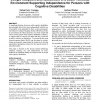1225 search results - page 39 / 245 » Design Principles for Intelligent Environments |
110
Voted
IFIP
2001
Springer
15 years 6 months ago
2001
Springer
The overall purpose of this paper is to demonstrate the relevance of semiotics concepts to the analysis of intelligent control systems. Semiotics has only a minor impact on resear...
140
click to vote
CATA
2003
15 years 3 months ago
2003
It is becoming more important to design systems capable of performing high-level management and control tasks in interactive dynamic environments. At the same time, it is difficul...
134
Voted
SIGCSE
2008
ACM
15 years 2 months ago
2008
ACM
Blind students are an underrepresented group in computer science. In this paper, we describe our experience preparing and leading the computer science track at the National Federa...
114
click to vote
AVI
2006
15 years 3 months ago
2006
The history of the human race is one of increasing intellectual capability. Since the time of our early ancestors, our brains have gotten no bigger; nevertheless, there has been a...
123
Voted
CHI
2008
ACM
16 years 2 months ago
2008
ACM
A significant fraction of persons with cognitive disabilities are potentially able to live more independently with the use of powerful tools embedded in their social environment. ...



